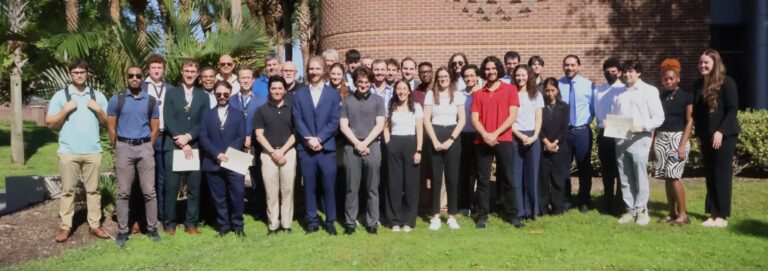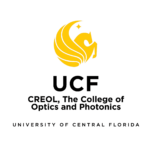New Takes on Technology in the Spotlight at Fall 2025 CREOL Senor Design Showcase
Students successfully demonstrated projects that aim to reduce the costs and limitations of widely-used technologies
Innovation isn’t always about developing entirely new technologies: often, it’s just as important to make existing tech more affordable.
That was a major theme at the Fall 2025 CREOL Senior Design 2 Showcase. The winning team built a confocal laser scanning microscope – a device that would normally cost tens to hundreds of thousands of dollars to buy.
“We built it for $800,” says photonic science and engineering (PSE) student Luc Therrien.
Therrien worked with fellow PSE student Collin Barber, electrical engineering student Josef Woodhouse, and computer engineering student Omar Castro to design the “Laser-Scope.”
Commercially available microscopes of this type are widely used in biology, medical imaging, and materials science. Besides the high price tag, they normally must be professionally serviced if anything goes awry. To cut the cost down and make their version more accessible, Therrien says they built the Laser-Scope using 3D-printed parts and components available from online suppliers. It has a comparable resolution as a commercial microscope would, and the team says the main limitation is the image processing speed.
“[Commercial microscopes] can get those images in seconds, maybe a minute at max,” Therrien says. “Ours takes minutes to hours. But it’s affordable and available for use on an open-source platform, so any researchers who may want to build it or utilize it, if they may not have the funding, can do so.”
The team was advised by CREOL Assistant Professor Yannick Salamin, ECE Associate Professor Wei Sun, ECE instructor Mark Maddox, and senior CS lecturer Mark Llewellyn. They took home medals and will share a $500 prize.
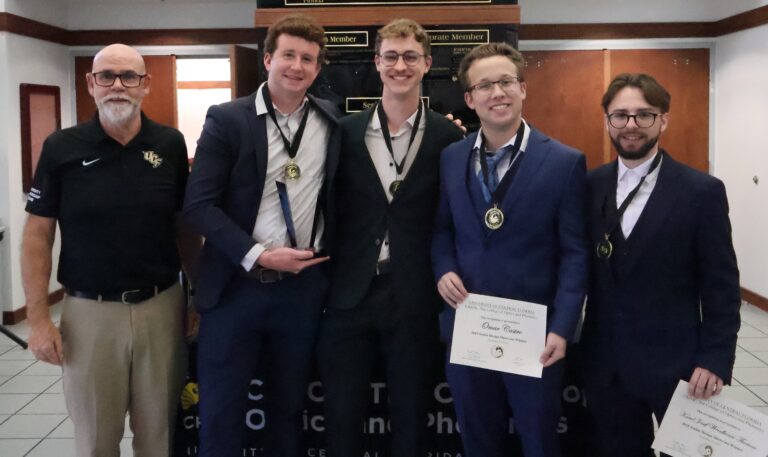
Rethinking existing technology was also the goal of the second-place team, which developed “SkinLumina”, a device that aims to change the field of dermatological scanning. The team also won “Best in Show” at the College of Engineering and Computer Science showcase, topping the list of more than 100 teams in the competition.
“Current dermatological settings use a template skin tone for all patients,” says PSE student Ryan Rodriguez, “This leads to underdiagnosis in people with darker skin tones. What we’re trying to do is use a two-scan imaging process to use a customized system that changes the LEDs based off the person’s skin tone, allowing for better accuracy in imaging.”
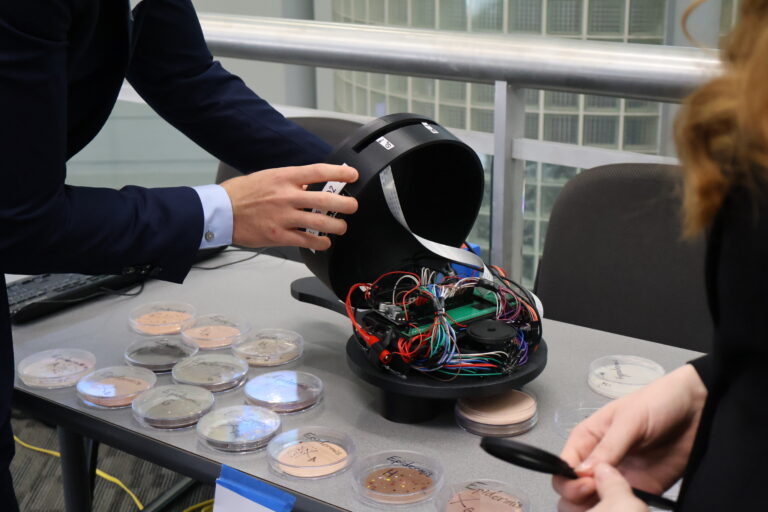
Rodriguez worked with Tatiana Cutrone (PSE), Tiffany Thani (computer engineering), and Abdullah Al-Gharabally (EE). The group even created a website and a “patient portal” to demonstrate how the system could be used in a clinical setting. Cutrone is also giving a talk about the concept at SPIE Photonics West in January 2026.
“I’m proud of the time and effort put in, and how we all came together as different majors to create such a unique product,” says Rodriguez.
The SkinLumina team was advised by CREOL Professors Aristide Dogariu, Peter Delfyett, and Stephen Eikenberry, along with ECE Adjunct Professor Justin Phelps and Dr. David Weinstein with UCF Dermatology. They will share a $300 prize.
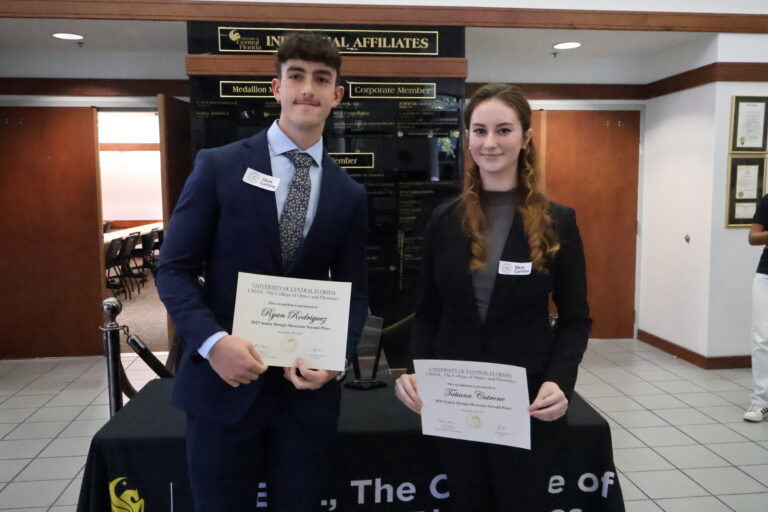
The third-place team’s project added a new twist to a popular video game. “S.T.E.P.S (Style Tracking Expressive Pad System)” will remind arcade fans of Dance Dance Revolution.
“It’s like a dance game, but with nine tiles instead of the traditional four,” says computer engineering student Christopher Solanilla.
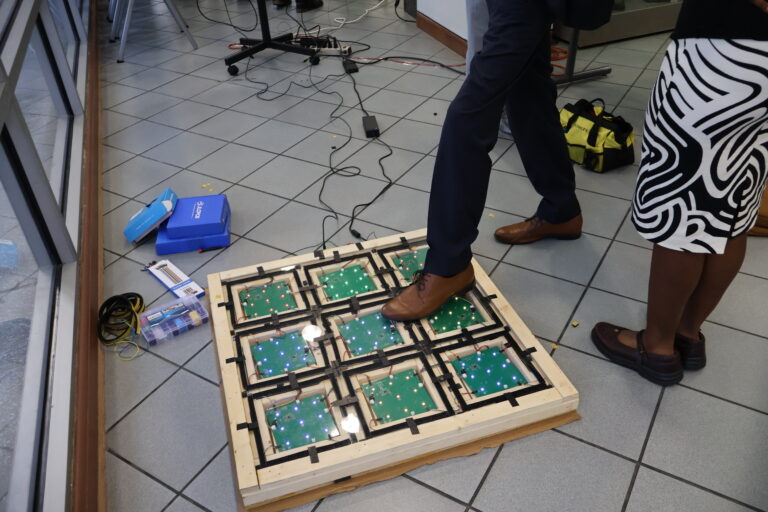
Solanilla’s teammates include fellow computer engineering students Jani Jon Lumibao and Andres Abrams, with Kaila Peeples (PSE), and Blake Whitaker (EE). In addition to the extra tiles, they added a new component to the dance game.
“We have a camera that watches you, and it tracks your pose, so while you’re playing the game, you’re going to be stepping on some arrows, and it’s gonna tell you to do a pose,” says Solanilla.
The team was advised by CREOL Professor Stephen Eikenberry, ECE postdoctoral scholar Justin Phelps, and ECE instructor Saleem Sahawneh. They’ll share a $200 prize.
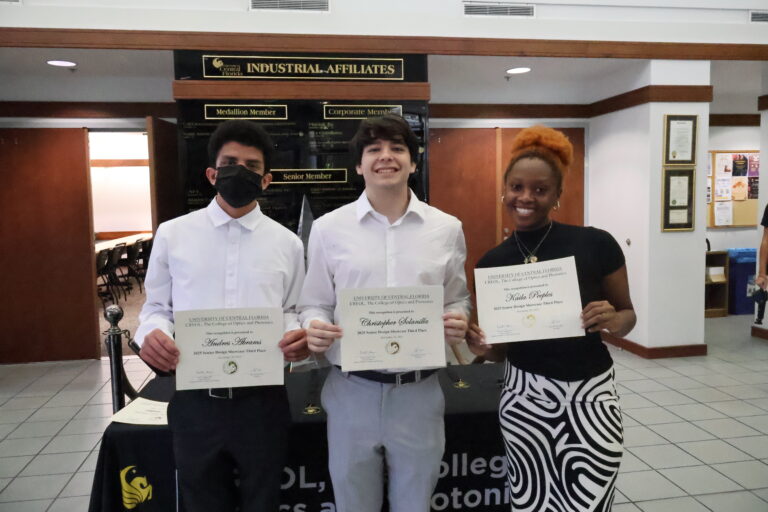
Another team made a splash at the larger CECS showcase: “LEBBVI: Laser Etching Books in Braille for Visually Impaired” was the competition’s Interdisciplinary Winner. Using a custom circuit board, the device uses a laser etcher to print items in braille.
CREOL student Vincent Pagliuca joined computer engineering students Raul Perez and Antonio Duford, along with John Childs (EE). They were advised by Sahawneh and CREOL Professor Andrea Blanco-Redondo.

The prizes were made possible by funding from CREOL Industrial Affiliates, who support the college with industry connections that promote research collaboration and provide students with mentorship and resources for outreach efforts. This year’s Showcase judges include Ty Olmstead (Ocean Optics), Ed Foote (LightPath Technologies), Wilfredo Ortiz (MKS), and David Roberts (BEAM co.). The Showcase was coordinated by CREOL Professor Aravinda Kar, with support from the SPIE, Optica, and Society of Optics Students chapters.
